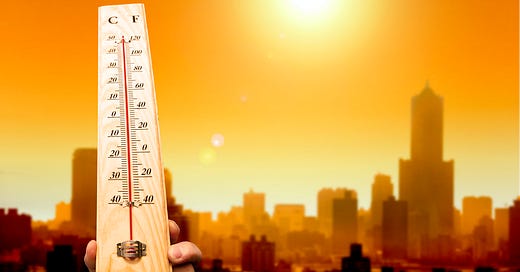The breathless reporting about record-shattering temperatures in the Pacific Northwest will soon give way to body counts. A part of the country that usually experiences moderate summertime temperatures is ill-prepared for extreme heat.
NPR reported yesterday the Northwest is among the least air conditioned areas of the country. Government surveys show Seattle housing is just 44% air conditioned; Portland is somewhat better at 78%.
The housing units least likely to provide a respite from the heat are filled with older and poorer people. These are precisely the populations most vulnerable to dehydration and the heat-related exacerbation of pre-existing conditions like asthma, heart disease, bronchitis, and emphysema.
My home city of Chicago learned its lesson the hard way in July 1995 when temperatures soared to 115 degrees and morgues began filling up in vulnerable city neighborhoods. More than 700 people, mostly elderly and poor, succumbed to the heat.
For a few years afterward, the city ignored this early warning sign of climate change’s lasting impact on its environment. But when another heat wave in 1999 carried off another 100-plus residents, officials began taking preparedness seriously. A Chicago Metropolitan Agency for Planning study predicted the area’s climate by 2100 would be more like Mobile, Ala., with average summer temperatures 5 to 13 degrees warmer than historic averages with days seeing 90-plus temperatures going from 15 a year to between 35 and 56.
To prepare for that eventuality, the city developed a plan for high heat-and-humidity days that included opening major cooling centers and circulating air-conditioned buses through neighborhoods where many living units lacked cool air. Unfortunately, the city proved incapable of reducing the violent crime associated with extreme heat or bringing down the increased smog and ground-level pollution on those high heat days.
Incomplete reporting
The Centers for Disease Control and Prevention does a poor job tracking climate-related deaths and disease. Its estimate of 600 deaths per year nationwide only counts deaths where heat is specifically mentioned on death certificates. Independent epidemiologists suggest the real total may be 20 times higher.
Heat-related mass death incidents are the new normal in an era of galloping global warming. Europe’s 2003 heat wave killed at least 30,000 people, with some estimates being more than twice that high. The World Health Organization estimates that 166,000 people died during heat waves between 1998 and 2017.
Epidemiologists also dispute the WHO figure, noting many developing countries underestimate heat-related deaths. India reported only 6,167 people died from heat between 2010 and 2018, which local experts said was only a tenth of the actual number.
It’s important for journalists to report deaths during a heat wave because it engenders pathos for the victims and focuses public attention on the existential threat posed by global warming. But public officials also need to focus on the long-term health effects of rising temperatures, which may be even more damaging and costly than immediate mortality.
A recent review of the medical literature concluded climate change negatively affects numerous health conditions. High temperatures and humidity are consistently associated with higher levels of infectious disease and worse respiratory, cardiovascular, and neurological outcomes. “Temperature is also associated with adverse nutritional outcomes (likely via crop production and food insecurity) and … are associated with some skin diseases and allergies,” the review, which was conducted by Canadian researchers, said.
Alas, the U.S. political system seems incapable of rising to the occasion. The “bipartisan” deal on the infrastructure package (it only attracted 10 GOP Senators) largely ignored climate change. According to advocates, it could even increase emissions.
Western reservoirs are at all-time lows. The Northwest is experiencing never before-seen temperatures. Though the heat is rising under the cauldron, our political frogs are doing the backstroke.




